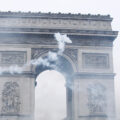Dividing lines: What can the UK learn from the murder of Samuel Paty?
Dividing lines:
What can the UK learn from the murder of Samuel Paty?
A long and tense history of debates over religious blasphemy and freedom of expression has recently been reignited in the UK. Parallels between this new controversy can be drawn to the murder of Samuel Paty. But what can the UK learn from the French situation?
On the 22nd March 2021, as part of a lesson on religious blasphemy, a religious studies teacher showed a cartoon of the Prophet Muhammad to his students at Batley Grammar School in West Yorkshire. The teacher forewarned his students that the image may be deemed controversial. Yet, despite the warning, the incident has triggered outrage amongst many British Muslims who believe the cartoon to be ‘offensive to the Islamic faith’.[1] Moreover, nationwide discussions on the ever contentious issue of freedom of expression and protection of religions have been reignited.
Batley Grammar School controversy
Swiftly after news of the lesson at Batley Grammar became public, demonstrators gathered outside the school to protest against the teacher’s action. Despite an apology from the school’s headteacher, many of the protestors who consisted largely of local British Muslims, demanded the teacher be sacked. Moreover, in the days following the incident, it was reported that the teacher faced a handful of death threats.[2] Despite this outrage from some British Muslims, many politicians and religious leaders have criticised the protests and displayed support for the accused teacher. Education Secretary Gavin Williamson condemned the “threats and intimidation” that the teacher has faced.[3] Moreover, in reaction, the Archbishop of Canterbury has stressed the importance of holding “onto freedom of speech.”[4] Alongside comments from politicians, a student at the school set up a petition which has garnered 6,000 signatures, defending the teacher and claiming that he “did not support the Islamophobic cartoons in any manner.”[5]
Parallels to France?
The event at Batley Grammar School and the subsequent reactions that unfolded have understandably led some commentators to reflect on the parallels between the murder of Samuel Paty and the Batley incident. In October 2020, Samuel Paty, a French school teacher, was murdered in a suburb of Paris after teaching a class on freedom of expression and showing his students the Charlie Hebdo 2012 cartoons depicting the Prophet Muhammad.[6] In the Batley incident, it has been widely reported that the image the teacher showed his students, depicting the Prophet Muhammad wearing a turban with a bomb in it,[7] was from the same French satirical newspaper.[8] Both teachers expressed their right to freedom of expression under respective national laws. Moreover, both teachers also faced threats of violence and online abuse, which tragically caught the attention of Paty’s murderer and resulted in the teacher’s death.
On the issue of death threats, referencing Paty’s murder, some commentators have expressed serious concern for the safety of the Batley teacher. Reflecting on the “violent rhetoric” of some British Muslim organisations after the Batley incident, English journalist Charles Moore asked “where do such things lead” and how easily the events in Paris six months ago could happen in the UK.[9] Moreover, the father of the Batley teacher expressed his fear about “what happened to the teacher in France who was killed for doing the same thing. Eventually they will get my son and he knows this.”[10] Therefore, clearly similarities do exist between the Batley incident and the murder of Samuel Paty. However, in the case of Batley, examination of historical tensions over the issue of freedom of expression and religious protection in West Yorkshire highlight a deeper-rooted rift at play that make the Batley incident a distinct case. As is often the case, here, context is of central importance.
The remnants of historical tensions
In 1988, British Indian author Salman Rushdie published The Satanic Verses which was inspired by the life of the Prophet Muhammad. However, the novel provoked international controversy as many Muslims accused Rushdie of blasphemy due to his critical portrayal of the prophet and Islam.[11] In 1989 in the British city of Bradford, just thirty minutes away from the town of Batley, a group of angered Muslims gathered to take part in a public book-burning of The Satanic Verses.[12]
In the present day, the hangover of the Satanic Verses controversy can still be felt and often plays a significant role in defining the relationship between British Muslims and secular society. In Batley particularly, where 30% of the town’s demographic is Muslim according to the 2011 census,[13] these tensions appear to sit just below the surface. All that is needed is an incident, such as the current school controversy, for tensions to boil over.
The impact of the Batley controversy on British society
Reflection on the impact of the Satanic Verses controversy highlights a difference with the events surrounding Samuel Paty’s murder. Moreover, it stresses the importance of historical context in relation to the current Batley incident. Following the incident, debates on the long-term impact of the Batley controversy on British society have unfolded. One such perspective that has been put forward focuses on the threat that the British Muslim protesters pose to liberal principles. Nick Timothy writes about how this incident reveals the anger of Islamists who, if liberals do not push back, will have increasing control over British society.[14] Moreover, columnist Ulrika Jonsson believes the protestors play straight into her own stereotype of “intolerant Islamic fundamentalists” and that she can already “sense the rumblings of antagonism ready to rise in the far-Right corners of this country.”[15]
However, some commentators are genuinely concerned that the political right will take the actions of a handful of protestors as reflective of the views of all British Muslims. Reflecting on the anger of Muslim protestors, Fiyaz Mughal, founder of several British NGOs, believes you would not find such outrage from British Muslims “before the Rushdie madness started in 1989.”[16] Moreover, Mughal states that the protestors risk giving an impression to wider society that British Muslims are “somehow intolerant.” Therefore, in order to not lump all Muslims together as fundamentalists, British society “needs to defend the politics of cohesion against the new agenda of division.”[17] Therefore, the Batley controversy showcases the ongoing complex and nuanced debate surrounding freedom of speech and freedom of religion in the UK. The murder of Samuel Paty has had a devasting impact in France and it is of great importance that British society does all it can to avoid such a tragedy occurring within their own communities. But beyond learning from France, it is clear that the UK must also learn from its own past and historical tensions in order to stop divisions from further deepening between the political right and conservative Islam.
Interested in similar topics? Go to the EARS Dashboard and get free updates.
[1] RE teacher ‘fearing for his life after death threats’ over Prophet Muhammed row
[2] RE teacher ‘fearing for his life after death threats’ over Prophet Muhammed row
[3] Education Secretary condemns threats to Batley teacher amid Prophet Mohammed cartoon row
[4] Archbishop of Canterbury speaks out amid Mohammed cartoon row
[5] Over 60,000 sign petition supporting teacher over ‘offensive’ Muhammed cartoon
[6] For a teacher in France, a civics class was followed by a gruesome death
[7] Religious leaders and politicians call for calm in Batley cartoon row
[8] Teacher suspended over use of Charlie Hebdo cartoons
[9] This Islamist rhetoric is designed to frighten – and we know where it can lead
[10] RE teacher ‘fearing for his life after death threats’ over Prophet Muhammed row
[11] 30 years on from Satanic Verses book burning, ‘Bradford has moved on’ | Bradford Telegraph and Argus
[12] Bradford rises above the ashes | The Independent
[13] Batley West Demographics (Kirklees, England)
[14] Batley’s hardliners are winning by exploiting Britain’s liberal principles
[15] Batley frenzy is a stark reminder we are really not ‘in this together’






